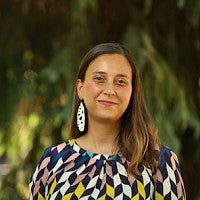
Anthropology
acarter4@uoregon.edu | 541-346-5037
Courses: Anth 150: World Archaeology; Anth 199: Atlantis, Aliens, and Archaeology; Anth 340: Fundamentals of Archaeology; Anth 346: Archaeology of Southeast Asia; Anth 448/548: Gender and Archaeology
In my courses you will (select two practices that are important to your teaching):
- Explore new perspectives.
- Think creatively about the past and its impact on our lives today.
I was invited into the Teaching Academy because (select all that apply):
- I participated in the UO Summer Teaching Institute.
In what ways are you working to make your teaching inclusive? For example, did you make any choices to improve students' sense of belonging in the course or to help students see their own interests and concerns as connected to those of the course?
In the Anth 150: World Archaeology course, I try to get students to think about the origin of things that seem normal and that we take for granted in our lives today (e.g. eating domesticated plants and animals, living in cities and non-egalitarian societies, making and appreciating art etc.). These are cultural activities that humans developed over time and I think that thinking about how these came to be can be awe-inspiring and humbling. In Anth 448/548, we talk a lot about how stereotypes about gender in our 21st century society are frequently based on bad interpretations of archaeological data.
What do you do in terms of professional engagement with the teaching and learning culture on campus or nationally? For example, did you attend any workshops, read articles about student learning, observe colleagues with similar goals for their students?
I participated in the 2018 Mobile Summer Institute on Scientific Teaching. I’ve also attended several TEP workshops and try to keep up with evidenced-based teaching practices.
In what ways was your teaching in this course research-led—informed by research on how students learn and inflected by UO's research mission? For example, did you articulate specific goals for student learning, structure small-group discussions and activities during class or online, assign activities to help students prepare, offer students an opportunity to reflect on their learning, or invite students into research processes?
In the Anth 199: Atlantis, Aliens, and Archaeology course, I tried to leave ample time in class for student reflection including think-pair-share discussions and online discussion activities where students considered a topic or question from class and then responded to one another. The final project for this class was really fun. We spent all term discussing how ancient aliens theories in archaeology (as one example) were problematic and unscientific. However, for their final project students had to take a real, scientific archaeological site and make a video or website using all the “bad science” techniques and tropes discussed in class. It was a fun and creative way for students to reflect on what we’d learned throughout the term and turn it on its head.
What are you reading right now?
Gods of the Upper Air: How a Circle of Renegade Anthropologists Reinvented Race, Sex, and Gender in the Twentieth Century by Charles King
